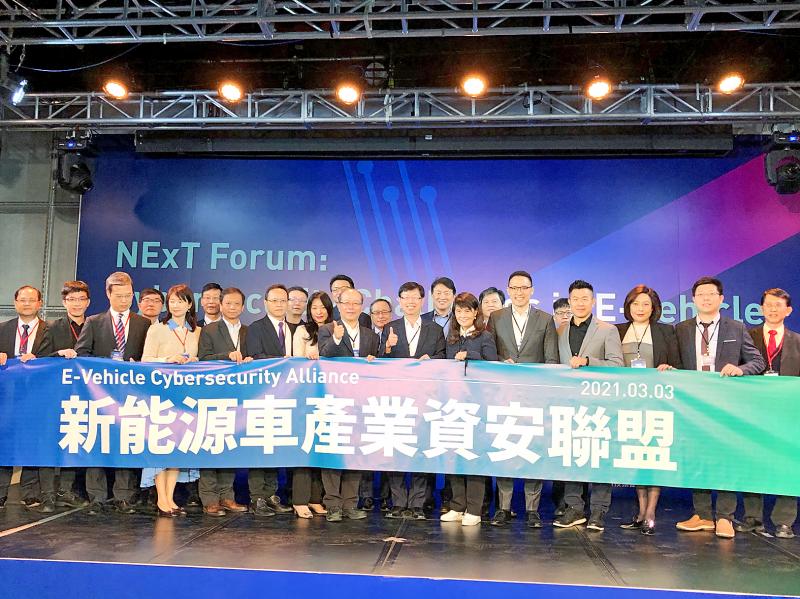Hon Hai Precision Industry Co (鴻海精密) yesterday announced the establishment of an industry group dedicated to cybersecurity for electric vehicles (EVs).
The E-Vehicle Cybersecurity Alliance, which was launched at a forum in Taipei by the Hon Hai Research Institute and the Chinese Cryptology and Information Security Association, would ensure that EVs are safe from hackers, Hon Hai chairman Young Liu (劉揚偉) said.
Taiwan’s business sector, research institutes and the government should work together to facilitate the development of data-secure vehicles, he added.

Photo: Chen Rou-chen, Taipei Times
“Hacking used to be a problem limited to computers, but in the age of 5G, everything can be hacked because everything is online,” Liu said. “It will be a key challenge in the next 10 or 20 years. If your vehicle is hacked, it can easily be stolen. It is not just an information technology problem, but the problem of every EV owner.”
Wu Tsung-cheng (吳宗成), a professor at National Taiwan University of Science and Technology, said that cybersecurity and privacy are indispensable in EV development.
The alliance would help build a safe and reliable environment for EV users, Wu said.
“US entrepreneur Marc Andreessen famously said that software is eating the world, but now software 2.0 is eating software 1.0,” Hon Hai chief technology officer William Wei (魏國張) said. “This means that instead of coding directly, programmers are using artificial intelligence to generate code.”
The Hon Hai Research Institute was inaugurated in January to focus on new technology development, including EVs. It has five main areas of research: artificial Intelligence, semiconductors, next-generation communications, cybersecurity and quantum computing.
Additional reporting by CNA

The US dollar was trading at NT$29.7 at 10am today on the Taipei Foreign Exchange, as the New Taiwan dollar gained NT$1.364 from the previous close last week. The NT dollar continued to rise today, after surging 3.07 percent on Friday. After opening at NT$30.91, the NT dollar gained more than NT$1 in just 15 minutes, briefly passing the NT$30 mark. Before the US Department of the Treasury's semi-annual currency report came out, expectations that the NT dollar would keep rising were already building. The NT dollar on Friday closed at NT$31.064, up by NT$0.953 — a 3.07 percent single-day gain. Today,

‘SHORT TERM’: The local currency would likely remain strong in the near term, driven by anticipated US trade pressure, capital inflows and expectations of a US Fed rate cut The US dollar is expected to fall below NT$30 in the near term, as traders anticipate increased pressure from Washington for Taiwan to allow the New Taiwan dollar to appreciate, Cathay United Bank (國泰世華銀行) chief economist Lin Chi-chao (林啟超) said. Following a sharp drop in the greenback against the NT dollar on Friday, Lin told the Central News Agency that the local currency is likely to remain strong in the short term, driven in part by market psychology surrounding anticipated US policy pressure. On Friday, the US dollar fell NT$0.953, or 3.07 percent, closing at NT$31.064 — its lowest level since Jan.

Hong Kong authorities ramped up sales of the local dollar as the greenback’s slide threatened the foreign-exchange peg. The Hong Kong Monetary Authority (HKMA) sold a record HK$60.5 billion (US$7.8 billion) of the city’s currency, according to an alert sent on its Bloomberg page yesterday in Asia, after it tested the upper end of its trading band. That added to the HK$56.1 billion of sales versus the greenback since Friday. The rapid intervention signals efforts from the city’s authorities to limit the local currency’s moves within its HK$7.75 to HK$7.85 per US dollar trading band. Heavy sales of the local dollar by

The Financial Supervisory Commission (FSC) yesterday met with some of the nation’s largest insurance companies as a skyrocketing New Taiwan dollar piles pressure on their hundreds of billions of dollars in US bond investments. The commission has asked some life insurance firms, among the biggest Asian holders of US debt, to discuss how the rapidly strengthening NT dollar has impacted their operations, people familiar with the matter said. The meeting took place as the NT dollar jumped as much as 5 percent yesterday, its biggest intraday gain in more than three decades. The local currency surged as exporters rushed to